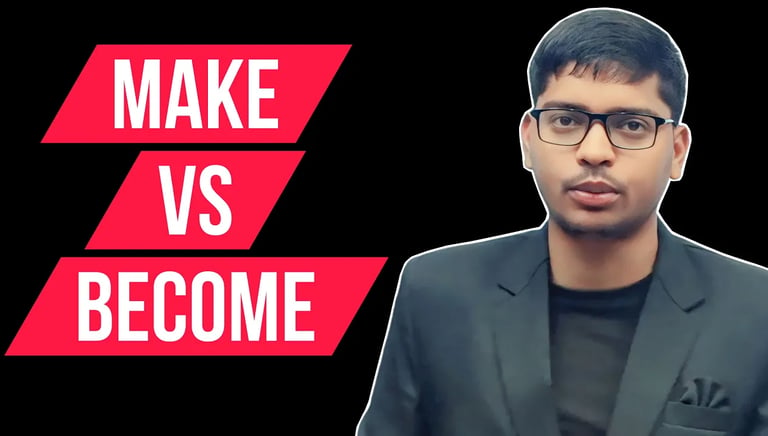Understanding the Difference Between 'Make' and 'Become'


Introduction to 'Make' and 'Become'
The verbs 'make' and 'become' occupy significant positions in the English language, each serving distinct functions that reflect fundamental aspects of action and transformation. Understanding the differences between these two terms is essential for effective communication. 'Make' typically signifies the act of creating or producing something. It embodies the idea of bringing an object, idea, or situation into existence. For instance, one might say, "I will make a cake," which illustrates the deliberate act of creating a tangible item through a systematic process.
On the other hand, 'become' conveys a more abstract notion of change or transformation. This verb indicates that something is changing from one state to another, often implying a progression or evolution. An example would be, "She will become a doctor," highlighting the transition from an educational background to a professional identity. While 'make' focuses on the acts of doing and constructing, 'become' emphasizes the journey of change and the resulting new state.
Both verbs have unique yet interrelated roles in language, impacting the way we describe experiences and actions. The application of 'make' generally involves a direct and tangible outcome, whereas 'become' engages with more conceptual or progressive undertakings. In everyday conversations, employing these verbs correctly allows speakers to convey clarity regarding the actions they are describing. By distinguishing between the creative processes associated with 'make' and the transformational nuances offered by 'become', speakers and writers can enhance their expressive capabilities and achieve greater depth in their communication.
The Usage of 'Make'
The verb 'make' is a versatile term in the English language, utilized in a variety of contexts to convey different meanings and actions. Primarily, 'make' refers to the act of constructing or forming something tangible or abstract. For example, when one says, "I am going to make a cake," it indicates the process of combining ingredients and performing actions to create a finished product. This usage of 'make' emphasizes the transformation of raw materials into a completed form, highlighting both creativity and effort in the process.
In addition to physical creations, 'make' is frequently used to convey the act of causing an event or provoking a response. A clear illustration of this application can be found in the phrase, "She made him laugh." Here, 'make' is indicative of prompting an emotional reaction, illustrating how actions can influence others’ feelings or states. In this context, 'make' serves as a powerful verb that connects actions with resulting outcomes, exemplifying the intricate relationships between cause and effect.
Furthermore, the term 'make' can emerge in various idiomatic expressions. Phrases such as "make a decision," "make friends," or "make a difference" encapsulate specific actions that reflect human interaction and societal contribution. In such instances, 'make' functions as a catalyst for engagement and progress, prompting individuals to take initiative and participate actively in their surroundings.
Through these examples, it becomes clear that 'make' is not simply limited to physical manifestations but extends into emotional and social realms as well. Mastery of the verb 'make' allows speakers to express a wide range of actions and intentions, enhancing their communicative abilities. Understanding its diverse applications can significantly improve one's command of the English language and facilitate more nuanced expression.
The Usage of 'Become'
The verb 'become' is commonly utilized to express transformation or the process of changing from one state to another. It signifies a transition in identity or condition, indicating that an individual or entity has evolved into something different than what they originally were. For instance, a student may become a doctor after completing medical school, demonstrating a clear shift in professional identity. In this context, 'become' emphasizes the development over time and the necessary changes that facilitate this transformation.
In various contexts, 'become' can also highlight emotional or psychological changes. For example, one might say they have become more confident as a result of their experiences. Here, the focus is on an internal transformation that occurs as a person navigates different life circumstances, thus impacting their self-perception and behavior. This nuance of 'become' serves to articulate the gradual nature of such changes, contrasting with more immediate actions often associated with the verb 'make.'
Moreover, 'become' can be applied to abstract concepts, such as 'becoming an expert' in a field. This not only implies gaining knowledge and skills but also points towards a complete metamorphosis in how one is perceived by others and oneself. In each of these cases, the word 'become' encapsulates a journey that results in a new state of being, drawing attention to the steps that lead to that destination. It's essential to recognize that 'become' is specifically suited for circumstances involving identity shifts or gradual change, providing a distinct meaning that sets it apart from 'make.'
Simple Examples and Practice
To effectively distinguish between the verbs 'make' and 'become,' it is beneficial to engage in practical exercises that highlight their unique usages in everyday language. One helpful method is to complete sentences that have been partially filled in, allowing readers to choose the appropriate verb based on the context presented. For instance:
1. She hopes to __________ (make/become) a doctor after finishing her medical studies.
2. The chef wants to __________ (make/become) new recipes that will impress his customers.
3. Over time, individuals may __________ (make/become) more proficient in their skills through practice.
These examples illustrate that 'become' typically signifies a transformation or development, whereas 'make' often refers to the act of creating or producing something. Understanding these nuances enables speakers to convey their thoughts more accurately.
Furthermore, analyzing real-life scenarios can enhance comprehension. Consider the following situations: a student, after years of hard work and dedication, finally graduates. In this context, we say, "He has become a graduate." Alternatively, during a team meeting, a manager states, "We need to make a decision soon." Here, 'make' emphasizes the action of deciding rather than a change of state.
To deepen your grasp of these verbs, think about personal experiences where you have either made something or experienced a significant change in your life. Reflecting on how 'make' empowered you to create a project and how 'become' portrayed personal growth will help solidify your understanding of these terms. By practicing these exercises and analyzing various contexts, you can confidently differentiate 'make' and 'become' and ultimately enrich your English communication skills.



